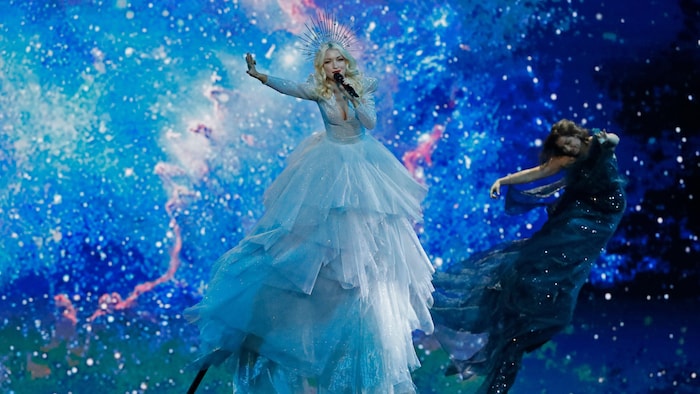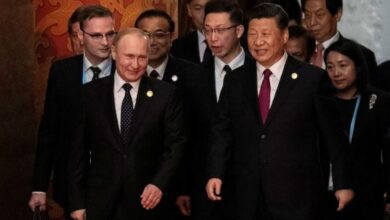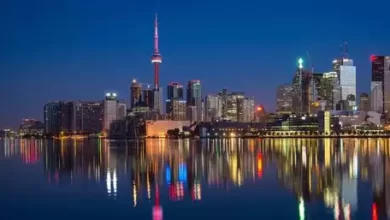Camp, choruses and a Canadian: Here’s what to expect at the Eurovision 2023 final

Montreal-born singer La Zarra is competing for France
Sprinkle the sequins and pump up the volume: The 67th Eurovision Song Contest reaches its climax on Saturday with a grand finale broadcast live from Liverpool.
There will be catchy choruses, a kaleidoscope of costumes and tributes to the spirit of Ukraine in a competition that for seven decades has captured the changing zeitgeist of a continent.
Here’s what to expect as acts from across Europe — and beyond — vie for the continent’s pop crown.
Who’s competing?
This year, 37 countries sent an act to Eurovision, selected through national competitions or internal selections by broadcasters. The host country is usually the winner of the previous year’s event, but 2022 runner-up Britain is hosting this time around on behalf of the winner, Ukraine.
Twenty-six countries will compete in Saturday’s final at the Liverpool Arena, in the port city that gave birth to The Beatles. Six countries automatically qualify: last year’s winner and the Big Five
who pay the most to the contest — France, Germany, Italy, Spain and the U.K.
The other 20 finalists, chosen by public votes in two semifinals on Tuesday and Thursday, are: Albania, Armenia, Australia, Austria, Belgium, Croatia, Cyprus, Czech Republic, Estonia, Finland, Israel, Lithuania, Moldova, Norway, Poland, Portugal, Serbia, Slovenia, Sweden and Switzerland.

Eurovision has earned a reputation for quirky performances featuring flamboyant costumes and sets.
PHOTO: AFP VIA GETTY IMAGES / JACK GUEZ
Wait … Australia?
Eurovision is about spirit, not just geography. Eurovision is hugely popular in Australia, and the country was allowed to join the competition in 2015. Other entrants from outside Europe’s borders include Israel and Azerbaijan.
Who are this year’s favourites?
It’s hard to predict victors in a contest whose past winners have ranged from ABBA to Finnish cartoon metal band Lordi, but bookmakers say Swedish diva Loreen, who won Eurovision in 2012, is favourite to score a double with her power ballad Tattoo.
Finland’s Kaarija was a crowd-pleaser in the semifinals with his pop-metal party tune Cha Cha Cha, and Montreal-born singer La Zarra (new window), competing for France, is also highly ranked for her Edith Piaf-esque chanson Evidemment.
And never underestimate left-field entries like Croatia’s Let 3, whose song Mama SC! is pure Eurovision camp: an antiwar rock opera that plays like Monty Python meets Dr. Strangelove.
What happens during the final?
Around 6,000 fans will attend the final, hosted by long-time BBC Eurovision presenter Graham Norton, Ted Lasso star Hannah Waddingham, British singer Alesha Dixon and Ukrainian rock star Julia Sanina.
Each competing act must sing live and stick to a three-minute limit, but otherwise is free to create its own staging — the flashier the pyrotechnics and more elaborate the choreography, the better.
Russia’s war in Ukraine will lend a solemn note to a contest famed for celebrating cheesy pop. The show will open with a performance by last year’s winner, Ukrainian folk-rap band Kalush Orchestra. Ukrainian singer Jamala, who won the contest in 2016, will perform a tribute to her Crimean Tatar culture.
One person who won’t be appearing is Ukrainian President Volodymyr Zelenskyy. He asked to address the final by video — but organizer the European Broadcasting Union said regrettably,
that would breach the nonpolitical nature of the event.
How is the winner decided?
After all the acts have performed, viewers in participating nations can vote by phone, text message or app — though they can’t vote for their own country. This year for the first time, viewers in non-participating countries can also vote online, with the combined rest of the world
votes being given the weight of one individual country.
National juries of music industry professionals also allocate between one and 12 points to their favourite songs, with an announcer from each country popping up to declare which has been granted the coveted douze points
(12 points).
Public and jury votes are combined to give each country a single score. Ending up with nul points
(zero points) is considered a national embarrassment. It’s a fate the U.K. has suffered several times.
The Associated Press ·With files from CBC News




